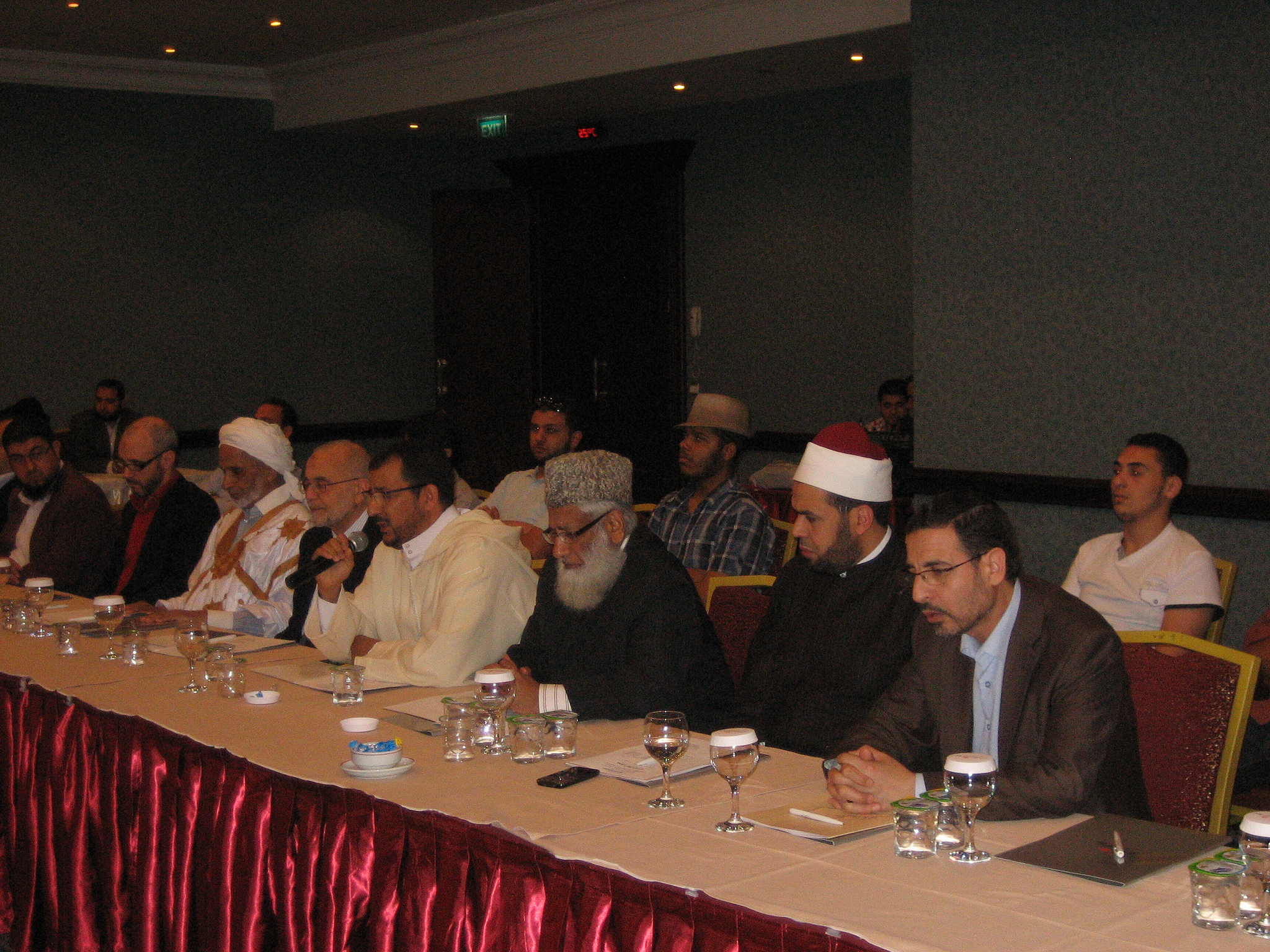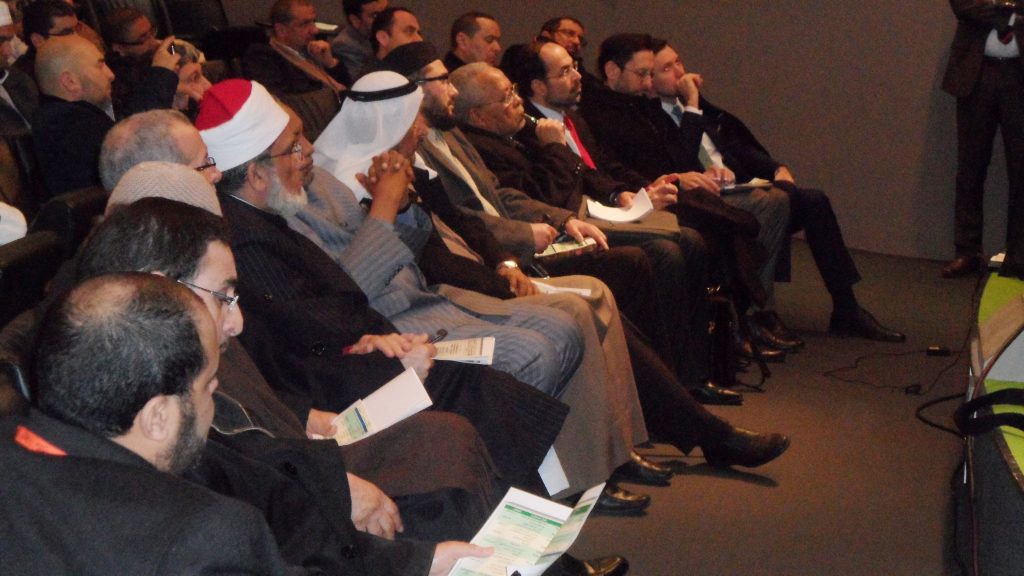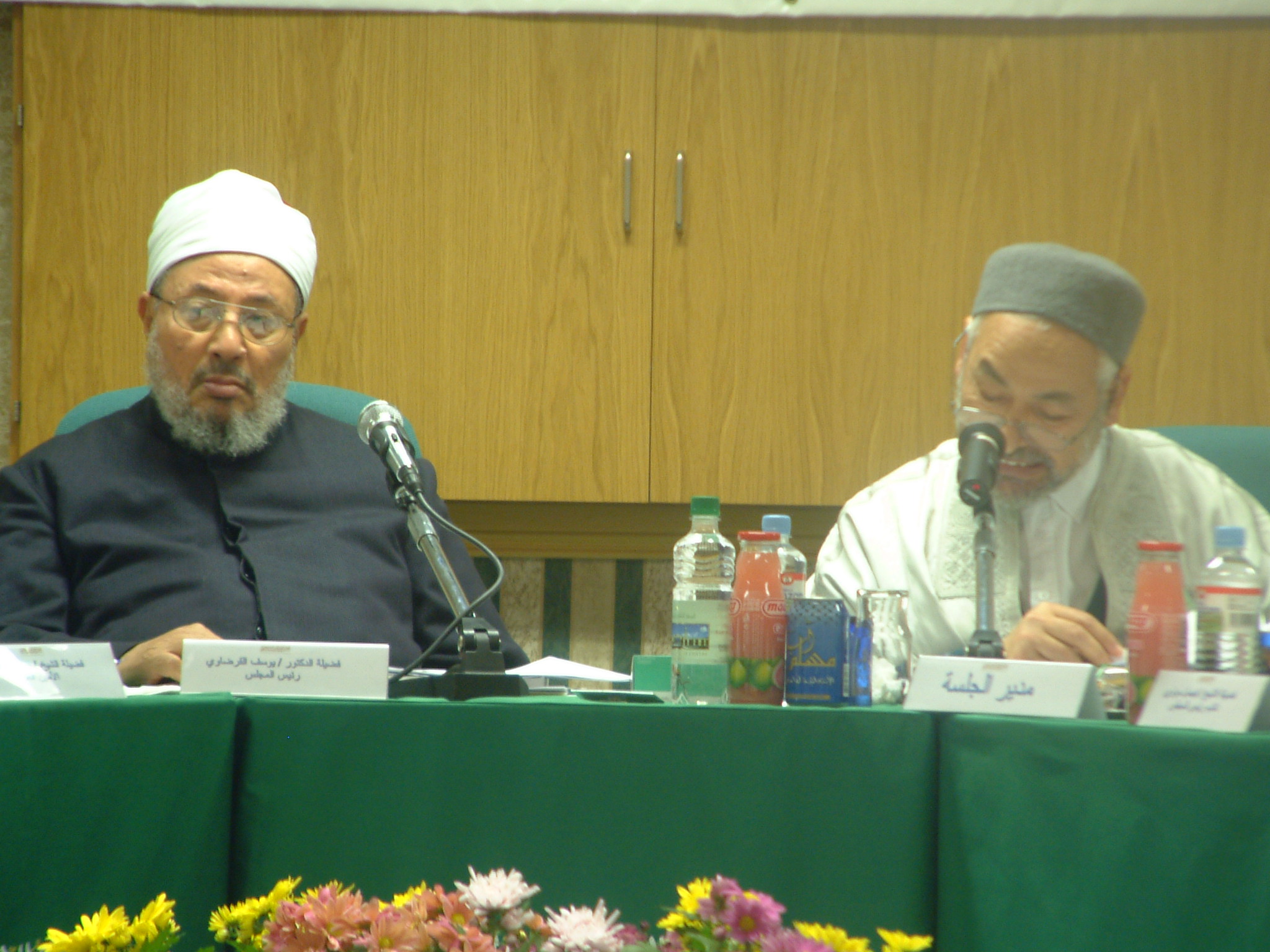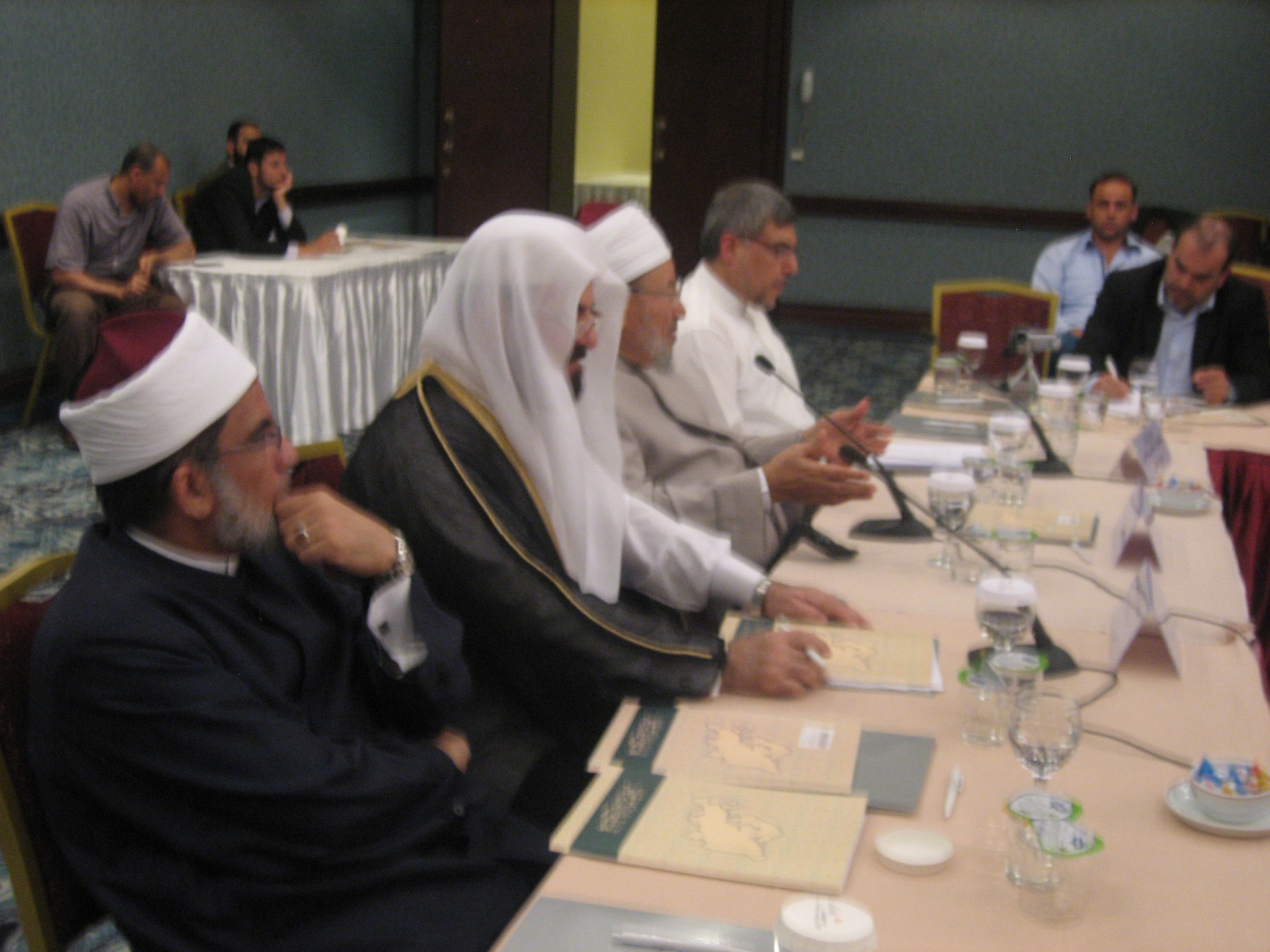The 3rd Ordinary Session of the European Council for Fatwa and Research Cologne – Germany
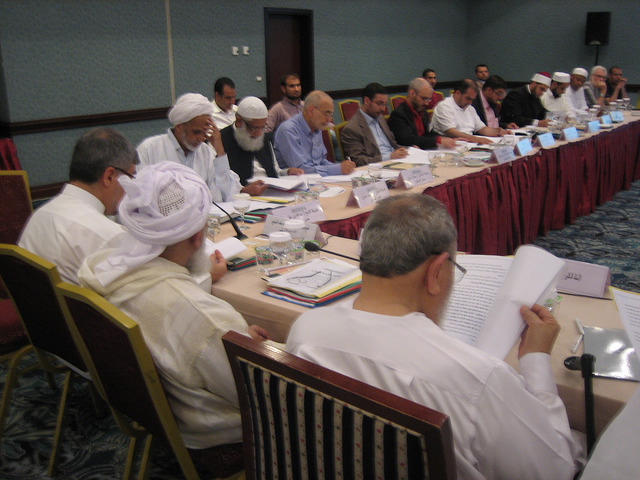
بسم الله الرحمن الرحيم
Final Statement
The 3rd Ordinary Session of the European Council for Fatwa and Research
Cologne – Germany
4-7/2/1420 AH, 19-22/5/1999
Praise be to Allah, The Lord of the worlds, and prayers and blessings be upon our beloved Muhammed, and all his descendants and companions.
The 3rd ordinary sesion of the European Council for Fatwa and Research was held in response to an official invitation by the Milli Gurush Turkish organisations in Cologne, Germany, between 4-7/2/1420 AH, 19-22/5/1999. The Council held its session under the presidency of the Honorable Sheikh Dr. Yusuf Al-Qaradawi and was attended by the majority of its members.
The Council addressed a number of administrative and financial matters of concern and passed the necessary resolutions in that regard. It then moved to examine a number of issues forwarded for its attention and passed the appropriate resolutions, the most prominent of which are as follows:
- The appointment of lunar months, particularly Ramadhan for the benefit of fasting and Shawwal for the benefit of break-fast, and whether Astronomy has any say in this matter.
The Council, having examined the forwarded papers and debated this matter at length and in great detail, reached the following resolution:
The beginning of Ramadhan and Shawwal is decided as a result of viewing, either by the naked eye or by means of ( ), when made in any Islamic country by sound legal means, in accordance to the holy prophetic saying in the authentic hadith: “When you see the crescent begin your fasting and when you see it again break your fasting”, and in another: “Fast when you see it (the crescent) and break your fast when you see it (the crescent)”. This is on condition that the firm scientific astronomical calculations do not contradict the possibility of such sighting in any country. If these calculations rule out the possibility of sighting, however, the sightings of individuals are rejected and refused as they may have occurred out of mistake, imagination or even a false and untrue claim. Moreover, the testimonies of individual witnesses constantly carry the element of imperfection, whilst astronomical calculations are sound and unequivocal, and the scholars have agreed that what is imperfect does not stand up to nor overtake what is deemed firm and sound.
The Council also affirms that by astronomical calculations, by no means is it referring to the prohibited and outlawed astrology, nor is it referring to the various calendars which have become widespread throughout Islamic countries, as many may believe. Rather, we mean by astronomical calculations, the fruits of the modern science of astronomy which is built upon sound arithmetic and scientific bases, which has advanced enormously and helped man to reach the moon and other planets, and in which Muslim scientists all over the world, have excelled.
- The legal decision in regards with meat and poultry products sold by non-Muslims in Europe.
The Council discussed this matter at great length acknowledging that it is a matter which has created great concern and debate amongst Muslims. The Council concluded that it is necessary for Muslims to abide by the conditions of slaughtering according to the Islamic Shari’a, so that they please their Lord and that they protect their identity from compromise and external threats as well as to protect themselves from consuming what is illegal and forbidden.
Having examined the various methods of slaughter, many of which consist of various illegal acts which lead to the death of a large proportion of animals, particularly chicken, The Council decided the illegality of consuming the meat of chicken and cows, whilst the meat of lamb, sheep and calves is allowed as the method of slaughtering these in many countries does not contradict the methods decided by the Islamic Shari’a. The Council hereby recommends to all Muslims that they establish their own slaughter houses so that they may fulfill this important need whilst protecting their religious and cultural identity. The Council also calls upon the Western governments to recognise the religious aspects of Muslims, including enabling them to slaughter according to Islamic Shari’a, similar to other religious communities and groups such as the Jews. The Council also calls upon the Islamic countries to import meat which has been slaughtered according to the Shari’a and which are supervised and administered by the trusted Islamic centres throughout the West.
- The Combination of Maghrib and Isha’a prayers due to the belated entry of Isha’a time or the disappearance of its legal signs in some countries.
The Council concluded that it is permitted to combine these two prayers in Europe during Summer when Isha’a enters around midnight, or the signs of Isha’a disappear totally, so that Muslims do not face difficulty which was lifted from upon them by virtue of the Holy Quran. This permission is also due to the hadith of Ibn Abbas in Sahih Muslim: “ The Prophet peace be upon him, combined the Dhuhr and Asr prayers and Maghrib and Isha’a prayers when he was not in a state of danger and when there was no rain. Ibn Abbas was asked: Why did he do so? He replied: He wanted to lift the difficulty from upon his Umma”.
In the same respect, it is also permitted for a Muslim to combine Dhuhr and Asr prayers in these countries during Winter when the day is very short and it becomes increasingly difficult for employees to pray each in its own time. The Council, however, warns Muslims against combining the said prayers without the actual need to and against making this permission a constant habit.
- Performing Friday prayer before Dhuhr (zawal) or after the entry of Asr.
The Council concluded that the correct and agreed upon time for Friday prayer (Juma’a) is after the entrance of Dhuhr (zawal) and before Asr, and it is upon the Imams to leave the controversial rulings to what is agreed upon whenever possible. However, should this contradict the circumstances of Muslims in some areas or at certain times or in certain circumstances, it is permissible to take the opinion of the Hanbali school that Friday prayer may be performed before Dhuhr (zawal). Alternatively, one may take the opinion of the Maliki school that Friday prayer may be performed during Asr, considering the difficulty to perform it during its proper time.
- The collection and distribution of Zakat by the various charity organisations.
The Council examined this issue and concluded that it is allowed for charity organisations to collect Zakat from its holders and subsequently distribute it amongst the eight ways of spending zakat, or those available at least. This is further emphasised due to the need for Muslims to organise their lives even if they were only three, as mentioned in the Hadith: “If you were three in travel, choose one of you to become your leader”. Moreover, this act is an implementation of the order of Allah that Muslims co-operate in all that is good and pious. The action of collecting and distributing Zakat is also one that enforces a major pillar of Islam which is not restricted in any way be the presence or absence of a Caliph, in accordance with the statement of Allah Almighty in the Holy Quran: “and fear Allah to the extent of your ability”, and the hadith: “If I order you to something, do as much of it as possible”. Therefore, if we find ourselves unable to establish the Caliphite whilst managing to perform other obligations and duties, we must do so as commanded by Allah Almighty and his Prophet peace be upon him, as it is also important to realise that the lifting of some obligations does not mean the lifting of all.
It is also significant to note that the Muslims during the Meccan era, were obliged to pay Zakat, as testified by the various verses in the Meccan chapters of the Holy Quran, despite the fact that the Islamic state of Madinah was yet to be established (The precise amounts and measures of Zakat as we know it today was established and decreed in Madinah).
The Council wishes to take this opportunity to forward to all Muslims the recommendations passed in the previous session as well the matters decided in this present one:
1- To maintain and preserve their Islamic identity and personality, by abiding by the commands and prohibitions decreed by Allah Almighty in relation to all their acts of worship, dealings, behavior, family and social relationships as well as pleasant and beautiful interaction with others.
2- The Council advises Muslims residing in Europe, to actively seek from their respective states, recognition of Islam as a religion and of Muslims as a religious minority, similar to other minorities, which would enable them to enjoy and practice their full rights and organise their civil status concerning matters such as marriage, divorce and inheritance. The Council also calls upon the European states to recognise the Islamic religion and the rights of Muslims, similar to the policies of countries such as Belgium, Austria, Spain and Hungary. For this purpose, the Council encourages Muslims to establish legal councils which would overlook their civil matters according to the pure Islamic Shari’a and in accordance with the laws and regulations in effect within their respective countries.
3- The Council also advises the Muslims and emphasises the importance of the teachings of the Holy Quran and the pure Sunna, as well as the consensus of scholars of Islam in regards with our commitment towards honoring our agreements and the regulations which govern our residence in the European states. This includes:
- The firm belief that the lives, wealth and honor of non-Muslims must never be transgressed upon in accordance with the agreement and treaty by which entry to these countries was granted, and without which such entry would never have been granted nor allowed. Allah Almighty stated in the Holy Quran: “and fulfill your treaties. Verily, treaties will be accounted for”.
- To respect and abide by the laws of these lands which have welcomed them, given them shelter, granted them protection and allowed them to prosper and enjoy all means of good living. Allah Almighty stated in the Holy Quran: “is the reward of good, but good”.
- To refrain from all means of false livelihood, such as the attempt of some Muslims to gain Social Security benefits whilst maintaining proper employment or practicing a trade.
- To spend all their efforts in bringing up the young generations, both boys and girls, in a modern Islamic manner, through establishing schools and educational and recreational centres, so that they may be protected from going astray.
4- The Council also advises all Muslims and those living in the West particularly, to hold tight to the rope of Allah and to the principles of brotherhood, forgiveness, moderation, co-operation in regards with what is good and pious as well as abiding by the manners of debate and dialogue in regards with matters of controversy, away from extremist actions which offer a blemished image of Islam and harm Muslims greatly, as these will undoubtedly be taken advantage of by the enemies of Islam and the ignorant. Allah Almighty stated in the Holy Quran: “call to the way of your Lord with wisdom and beautiful remembrance and argue with them in the way that is best”.
The President and members of the European Council for Fatwa and Research would also like to take this opportunity to thank the Islamic Community of Milli Gurush in Germany for their beautiful hospitality in hosting this session. The Council would also like to thank the Federation of Islamic Organisations in Europe for its great efforts as well as the German government which facilitate the entrance of the members of the Council which allowed for the success of this session.
Prayers and blessings be upon our beloved prophet Muhammed peace be upon him, his descendants and companions, and Praise be to our Lord, Allah Almighty.

